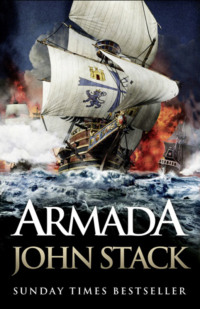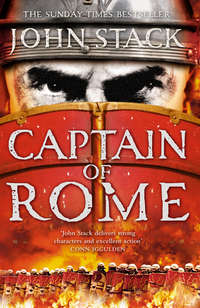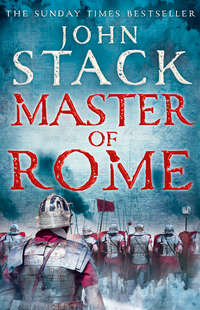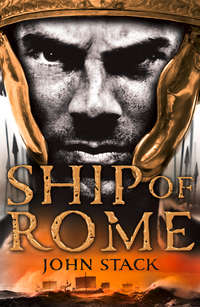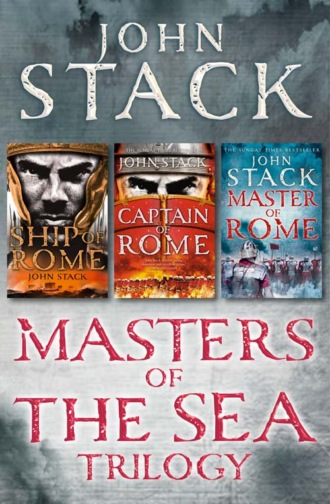
Полная версия
Masters of the Sea Trilogy: Ship of Rome, Captain of Rome, Master of Rome
Scipio had called her to his room the night he’d arrived in Brolium, but this time was different. She could see the Roman could barely contain his sudden desire. Scipio never questioned why impending danger had this effect on him, he simply gave vent to his base desires. Tomorrow he would take sail back to Rome and he would need to show the calm exterior of a leader of Rome to all on board the galley. He would need to bury deep the excitement and lust for action threatening to manifest itself in his expression. Only now, in the privacy of his quarters, as he moved slowly towards the woman, could he give in to his emotions, the brief coupling a chance to assuage his exhilaration at the approach of danger.
The sun had become a memory for the men on board the Aquila as they continued preparations for the dawn departure. The sky still held the light of the departed star, but it was rapidly losing ground to the approaching night, the headlands at the edge of the harbour mouth becoming mere darkened shadows against the more reflective sea.
Lucius approached Atticus on the foredeck.
‘We’ll be ready to sail by dawn, Captain. The last of the supplies are just arriving from the port barracks.’
‘Very good, Lucius. Have my cabin cleared and made ready for the senior consul.’
‘Yes, Captain,’ Lucius replied, and was immediately away.
Atticus moved to the starboard rail. All around him the frantic activity of preparation continued. As always the sound most commonly splitting the air was the roar of Lucius’s voice, his words a whip crack to a careless or indolent crewman. To Atticus the sound was as much part of the ship as the creak of the deck timbers or the lapping of the tidal waters against the hull ten feet below him. His mind tuned out the sounds as his eyes wandered over the barges spread out across the harbour before him. In the near darkness he could vaguely distinguish their shapes, their hulls swinging slowly against the hold of their anchor lines as the current of the outgoing tide kept their hulls in parallel with each other and perpendicular to the dock. The same current pulled at the hull of the Aquila, drawing her away from the dock. She answered in kind, as if eager to sail, a creature born to the sea, pulling gently at the ropes that held her fast.
The words of Septimus’s former centurion, Marcus, rang in Atticus’s ears: ‘Whatever needs to be done, you need to do it,’ he had said, and Atticus remembered how Septimus had consented without hesitation, revealing the unbreakable bond between former comrades and fellow Romans.
A descendant of Magna Graecia and a sailor all his life, Atticus had never felt any attachment to the Roman citizens of the land-based legions. His duty had always been to his ship, his crew and the people of the Ionian coast under his protection, not to a Republic that was forged by men who were a breed apart from the people of his home city, Locri.
Atticus’s ancestors had migrated from Greece over generations, slowly evolving and adapting the local culture to their own. In contrast, the legions of Rome swept over entire regions in a fraction of a lifetime, transplanting their culture and the ideals of their city as they went, absorbing entire populations into their Republic within a single generation.
Atticus stood on the border of two worlds, his friendship with Septimus drawing him ever closer to Rome and the legions, while men like Scipio and Marcus blocked his path with distrust and age-old animosity. Beneath it all, Atticus could hear his ancestors whisper censure and lament for his association with Rome as they spoke of an ancient loyalty to his people who, for over five hundred years, had made southern Italy their own.
The day dawned with the scent of must in the air, the scent of the dry arid land of northern Sicily. Atticus rose from his cot in one of the smaller aft cabins of the Aquila and looked out through the opened hatch to the harbour beyond. From his vantage point he could see that all of the transport barges were preparing for departure, taking advantage of the turn of the tide that would ease their navigation of the harbour mouth.
The barges were lumbering vessels when docked, like beached pilot whales lying on their backs in the sun. Under way, however, with their massive mainsails pushing them through the waters, they were transformed into living, breathing creatures, and Atticus admired the seamanship required to sail these vessels in the open seas. A worry crossed his mind that they were sailing into waters where the Carthaginian hunters would be seeking them, but he quickly dismissed it. The Punici only held the ports of Thermae and Panormus, over one hundred miles further along the coastline, and they would be unaware of the Romans’ activities in Brolium. Without local knowledge it would take them weeks to discover that this port was the Romans’ supply hub for the entire campaign. Only then would they be able to mount an effective blockade. The departing fleet of barges would be safely home long before that day.
Atticus left the cabin and went on deck. He was immediately beckoned to the aft-deck by Lucius, the second-in-command turning and pointing over the stern rail. A hundred yards away, Scipio was leading a guard detail of praetoriani towards the Aquila. Their approach was framed by the rapidly rising sun in the eastern sky, the clear blue indicating fine weather ahead and the prospect of a quick sailing. He ordered a runner to go below and tell Septimus that Scipio was arriving and to meet him at the head of the gangway. The senior consul would expect to be welcomed aboard by the senior officers of the ship.
‘There, sire,’ the man pointed, his hand shaking, ‘low on the horizon. That’s the headland. Cape Orlando. Brolium is a league west.’
‘You’re sure?’ Gisco asked, his voice threatening the same fate the pirate had seen his crewmates suffer.
‘Yes, sire, I swear it,’ he whimpered, ‘we were in these waters for four weeks. We saw the Roman transport barges ply in and out of Brolium many times, although they were too big a prey for us to take. The latest fleet of over two dozen arrived only three days ago.’
Gisco grunted a reply as he stared through the pre-dawn light to the dark mass of the headland on the horizon.
‘Remove this man from my sight,’ he ordered, ‘throw him over the side.’
The pirate screamed for mercy as the guards lifted him off the deck. In two quick strides they were at the rail and they threw the pirate overboard, his cries cut short as he hit the water ten feet below. Within seconds he was lost beneath the waves.
Gisco smiled. The gods were looking favourably on him this day. The day before, one of the galleys in the rearguard of the fleet had captured a pirate bireme as they moved north through the strait. Many of the crew were instantly put to the sword, the Carthaginians sharing the hatred of pirates that all men of the sea held, but the senior crew had been brought to the flagship where they were tortured for information on Roman naval activity in the area. Gisco’s original plan called for an extensive search to find the Romans’ supply hub once the fleet had reached Panormus, but fortune had smiled on him and the pirates had now given him the information he needed to carry the battle to the Romans.
‘Captain Mago,’ Gisco ordered, ‘signal to the fleet: the first four squads are to remain on station here with the Melqart. The remaining six are to continue to Panormus with all possible speed. Have the squad commanders report to the flagship.’
‘Yes, Admiral,’ Mago replied, and took off towards the stern to signal Gisco’s orders to the ships behind them. Within minutes the four squads of five galleys had broken off from the fleet, each squad comprising a quinquereme leading a group of four triremes. The Melqart also broke formation.
Fifteen minutes later the four squad commanders boarded the Melqart. Gisco met them on the foredeck.
‘The Romans are using the port of Brolium as their supply hub. It is there …’ Gisco pointed towards the distant coast ‘… two points west of that headland. We will move two leagues north of here and cast our net across their course to the mainland. Deploy with bows forward to the mainland. No sails. I want the profile of your ships to be as small as possible. At that distance out, when we are spotted, the transport barges will be too far from port to run. I want your quinqueremes on the extreme flanks. I will take the centre. Get behind them quickly and push them towards me. We will crush them between us.’
‘Yes, Admiral.’ The four captains saluted and turned to leave the foredeck.
‘One more thing, Captains,’ Gisco added, arresting their departure. ‘We take no prisoners. Every barge is to be sunk. No exceptions. Understood?’
‘Yes, Admiral,’ they repeated and left.
‘Now,’ Gisco thought as he looked up at the rapidly brightening sky, ‘let them come.’
Drusus Aquillius Melus, captain of the transport barge Onus, was nervous. Word had swept through the port of Brolium that the trireme that had rushed into the harbour the day before had encountered a Carthaginian fleet of galleys. The rumours had been contradictory, with some claiming the fleet was travelling east and others that it was going west, while estimates of its number varied from three to over a hundred. One thing was clear though, and on this all were agreed, their days of shipping supplies from the mainland to Brolium were numbered. Melus hoped that the days of his life were not similarly marked.
The captain looked up at the mainsail and checked its line as his barge moved slowly out of the harbour. His ship was two hundred feet long and thirty feet wide, a behemoth of the sea, as long as a quinquereme, but wider in the beam and over twice as tall from the waterline. The offshore breeze was light and he estimated their best speed once clear of the port would be no more than five knots. At this speed the passage to Naples would take nearly two full days. He looked over his shoulder at the thirty-two other barges making their way ponderously under sail. They would separate out as the day wore on, the new ships outpacing the older, the experienced crews faster than the inexperienced. Each ship had its own pace. Unique. By nightfall they would aim to have a half-mile between each ship, to avoid collisions in the dark. Now, grouped together, the flotilla of transports seemed to Melus to resemble a flock of sheep, the bellies of their broad white mainsails stretching out across the width of the harbour. A sight to see. He looked up above them to the sky overhead. It was a clear day which promised clear sailing. Perfect weather for navigation. Two days, he repeated to himself, two days and home.
The Aquila cast off from the dockside as the last of the transport barges weighed anchor and raised sail. The larger vessels moved slowly under sail and Gaius wove the Aquila nimbly through their ranks using the galley’s superior manoeuvrability under oars. Scipio stood alone on the aft-deck, watching the action of the crew around him intently, his journey on the Aquila marking his first time on a galley. The consul was travelling light in comparison to his arrival three days before on one of the transport barges. The confined and valuable space aboard a fighting vessel meant that his entourage consisted of merely his guard commander and four praetoriani with his Nubian slave, Khalil, in attendance. In any other place the reduced guard would be foolhardy, but in the isolation of a galley at sea it seemed almost excessive. The only enemies that threatened him were the Carthaginians and, if the Aquila was somehow attacked in strength, the fact that his guard was four instead of twenty-four would make little difference.
Atticus watched the consul surreptitiously as the Aquila gained the lead on the fleet of barges. Lucius ordered the sail raised, transferring the exertion of the rowers to the wind. The galley’s combination of oars and sail would maintain a slight gap on the barges, keeping her in the van of the flotilla. Septimus joined Atticus on the foredeck.
‘Rome!’ he smiled, and slapped Atticus’s shoulder.
Atticus couldn’t help but smile, his friend’s good mood at returning to his home city infectious.
As a younger man, with the wanderlust of youth powerful in his veins, Atticus had wanted to travel to Rome and all the great cities of the Republic, and from there beyond to the distant shores of the Mediterranean, the great sea that touched all the coastlines of the known world. That ambition had narrowed with age, tempered by realities and his duty to his ship and crew. But the desire to see Rome had always stayed with him, a desire to see the centre of the Republic, to grasp the atmosphere in the city that inspired men to conquer the world around them.
Captain Melus stared at the galley moving effortlessly through the water. The wind had picked up after leaving port and so now, two hours out from Brolium, the galley was still within a mile of the leading ships on the port side of the fleet. Melus had served twenty years on a trading galley, rising to the rank of boatswain. His share of the profit over those years had provided him with the opportunity to purchase a part share in the Onus which, thanks to the campaign on Sicily and the almost constant supply drops, was proving to be a profitable investment. That would all change with the commencement of a blockade and Melus cursed Fortuna for her fickle nature.
Suddenly, as Melus watched, the mainsail of the galley collapsed. Even over the distance of a mile, the captain could see the deck of the galley come alive. Something was wrong.
‘Ship ahead!’
Melus turned. The cry had come from the masthead. He looked up to see the lookout pointing directly ahead of their course. An acid feeling of dread filled his stomach as he rushed forward to the foredeck. Peering out over the rail, he waited to see the reported ship, his viewpoint twenty feet below the masthead making him wait before seeing what the lookout had seen.
‘There,’ his mind screamed, ‘dead ahead.’
He blinked his eyes rapidly to clear them and refocused on the unexpected and yet feared sight in front of him. He couldn’t make out any details beyond the fact that it was directly facing them, its bow pointing like an arrow at his own. It looked like … no, he was certain … it was a galley.
‘Two more ships ahead! A point off starboard and port!’ the lookout called again. Melus could hear fear in the man’s voice at the realization of what he was seeing. Within five seconds he could also see the two ships himself, flanking the first. It was an ambush. There was no doubt and there could be no doubt of who they were.
Melus was about to sound the alarm when he heard the resonating sound of a signalling trumpet from the fleet behind him. In foggy weather these trumpets were used to alert other ships to avoid collisions. In clear conditions their repeated blasts meant mortal danger.
‘Two more ships ahead!’ The lookout’s cries were now frantic. ‘Two points off starboard and port!’
The captain ignored the cries from above, his mind trying to comprehend the warning sounds he was hearing. They weren’t emanating from the ships around him, from those who could also see the ships ahead, but from the rear of the fleet. ‘They can’t have seen them yet,’ his mind was telling him, ‘unless …’ He felt a sharp pain in his lower intestines as terror overtook his emotions.
‘Sweet mercy …’ he whispered at the realization of what was happening. ‘They’re all around us … we’re trapped.’ ‘Prepare for action!’ Atticus roared, his orders overlain with the repeated blasts of warning trumpets from the transport fleet behind. Five galleys could be seen on the horizon, with the lookout reporting four more on the flanks. The Romans had sailed into a perfect trap.
‘Gaius! Two points to starboard. Prepare to sweep. Lucius, orders to below, attack speed!’
‘Hold!’
Atticus turned to see Scipio standing beside him, the consul’s face a mask of fury.
‘Explain yourself, Captain!’
‘I’m going to sweep the portside oars of the outermost galley. If we disable her we’ll open a gap in the line to allow some of the transports to escape,’ Atticus said quickly.
‘To Hades with the transports. Your orders are to escort me safely to Rome!’
‘With all due respect, Consul,’ Atticus growled, his expression hard, ‘we can’t abandon the transports to the Punici. Without our assistance they will be slaughtered to a man.’
‘I am in command of this galley, Captain, and my safety is paramount!’
Atticus stepped forward and leaned in slightly to respond, an instinctive movement to reinforce his argument.
Scipio’s guard commander spotted the move and instantly drew his sword, misreading Atticus’s stance as a prelude to attack. Within a heartbeat the four praetoriani followed suit. Gaius and Lucius drew their own daggers, their reactions instinctive.
Only Atticus and Scipio remained immobile, their faces inches apart, their expressions unwavering. Atticus could feel the blood thumping in his chest, the adrenaline coursing in his veins, his mind racing, his ears filled with the sound of two conflicting voices screaming within him. One called for caution, knowing that Scipio could kill any who disobeyed without remorse or recourse. The other demanded defiance, the fate of hundreds of men in the transport fleet in the balance. To his left and right Scipio’s praetorian guards stood with their swords drawn, outnumbering his crew on the aft-deck, their lives on the brink of forfeiture.
‘Gaius! Hard to port!’ Atticus shouted. His command was met with silence and he turned to the helmsman. Gaius was tensed, his body coiled to release at the first sign of an attack from the praetorian guard opposite him.
‘Now, Gaius!’ Atticus roared, breaking the taut spell that held each man ready on the aft-deck. The helmsman instantly obeyed, sheathing his dagger before leaning on the tiller, turning the bow away from the oncoming Carthaginian galley.
Scipio remained rigid, his eyes focused on Atticus before him, anger still threatening to overwhelm him. With immense will he suppressed the urge to order the captain killed, to expunge this questioning of his authority, this affront to his power. He reasserted his reason, knowing that, at least for now, the captain was invaluable.
‘Stand down!’ he ordered and his guards immediately obeyed.
‘Captain?’ Scipio said, his voice low and menacing. He drew Atticus over to the side rail.
‘This ship belongs to Rome, Captain, and on this ship I am Rome. This crew may look to you for command. But make no mistake, Perennis, I command here. Do not hesitate to follow my orders again.’
‘Yes, Consul,’ Atticus replied, suppressing the last of his defiance, allowing the consul to bend him to his superior will.
‘Attack speed!’ Gisco ordered with relish. ‘Steer an intercept course for the lead barge.’
The Melqart came alive under his feet, its two hundred and seventy rowers on four levels bending their backs to the task of bringing the quinquereme up to attack speed. ‘Like sheep to the slaughter,’ Gisco thought, with a smile as the rising rhythm of the oar-strokes matched the rising tempo of the blood pumping in his veins. There was no escape for the Romans. By now the other quinqueremes would be closing the trap behind the transport fleet, cutting off their escape back to Brolium. Against unarmed barges the fight would be no more than practice for the helmsman of each galley, a chance to exercise their skill at ramming and withdrawing from enemy ships. Gisco estimated the fleet at well over two dozen barges. Far off to his right a lone galley was preceding the transport fleet, her course set to collide with the far right flank of the Carthaginian attack. Gisco regretted that the Roman galley was not within easy range for his ship but then dismissed the thought. There would be plenty of Roman blood spilled on the waters this day.
‘Maintain course!’ Melus roared to the aft-deck.
The gap between his barge and the Carthaginian ships ahead was closing rapidly as the Onus set her bow against the centre galley. The sound of breaking timbers caused him to tear his eyes from the approaching galleys to the fleet behind him. Two transport barges had collided, their frantic efforts to escape causing them to accidentally turn into each other. They’re dead men, Melus thought with finality, knowing that the crew of the Onus would surely follow them to Elysium if he could not find a way out of the trap.
Melus’s twenty years’ experience on trading galleys flashed through his mind. There was only one chance. The galleys were better armed but the transport barges were bigger, almost twice the size of a quinquereme. Against ships that size, Melus knew the galleys could not ram them head on. They could only attack, and ram, on the flanks. His only chance was to run directly at the ship approaching him and hope that the Carthaginian would turn.
Strange, Gisco thought, noticing the barge his galley was targeting had not turned. She was coming directly for the Melqart, the gap down to two hundred yards and closing rapidly. Gisco instinctively braced as he contemplated a head-on collision with the larger ship. The adrenaline in his blood coursed through him, picturing the Melqart striking the barge through the bow at ramming speed. The collision would be terrifying, the combined speed of both vessels nearly twenty knots. The Melqart would survive, of that Gisco had no doubt, but the damage would be catastrophic and casualties high. But what of the story? he thought. What of the story sweeping through the fleet of how Gisco had faced a ship twice the size of his own and rammed her through the bow? No one would ever doubt the courage of Hannibal Gisco.
‘Ramming speed!’ Gisco bellowed. ‘Prepare for impact!
‘Cronus!’ Gisco’s commander of his personal guard was instantly at his side.
‘Commander, station two of your men on the aft-deck. If the helmsman alters course against my orders, run him through!’
‘Yes, Admiral,’ Cronus replied and was gone.
Gisco’s will hardened as the Melqart came to her top speed.
The Aquila swept across the bow of the Carthaginian galley at a distance of two hundred yards. Atticus waited for the enemy ship to alter her course to intercept, willing the Carthaginian to turn, to force the engagement, thereby allowing Atticus to circumvent the consul’s orders. The Carthaginian vessel stayed unerringly on course, the prospect of so many more vulnerable targets too great a temptation for the Carthaginian commander. Atticus cursed at the clear waters ahead of his galley. Over his shoulder the transport fleet was now in utter chaos, with every barge seeking to escape the Carthaginians’ trap. Lacking the speed and manoeuvrability of the enemy galleys, their attempts to flee were hopeless.
The Carthaginian galley was not turning. She was not altering her course. Melus replayed his plan in his mind and could find no flaw in his thinking. The Carthaginian should turn. A head-on collision would cause tremendous damage to the galley, damage that could easily be avoided if they turned and pursued.
‘She is commanded by a madman,’ Melus thought, his shaking hand holding the tiller, doubt and fear assailing him. He measured the distance between the converging ships. The enemy galley was one hundred yards ahead, her bow arrow-like on its determined course.
Eighty yards.
Melus could clearly hear the unchecked drum beat of ramming speed, the sound unnerving, shattering the confidence of his earlier conviction.
Sixty yards.
A sudden urge to turn and run tore through Melus and he closed his eyes to suppress it, clinging to the belief that there was still a chance the Carthaginian would flinch.
Forty yards.
Melus opened his eyes. The prow of the Carthaginian galley filled his vision, its insistent course unerring. His breath froze in his throat as his nerve collapsed, his wits fleeing before the sight in his mind of the destruction of the Onus and her crew, a fate that could not be endured, a fate that could yet be avoided if he turned …


